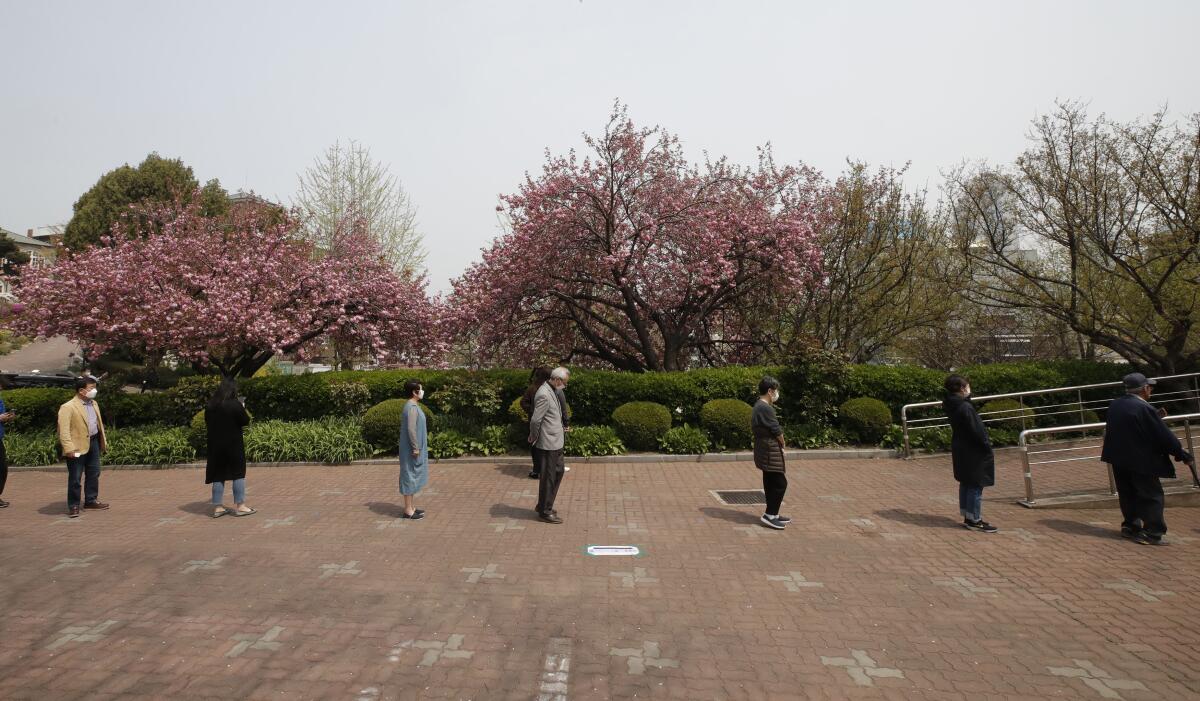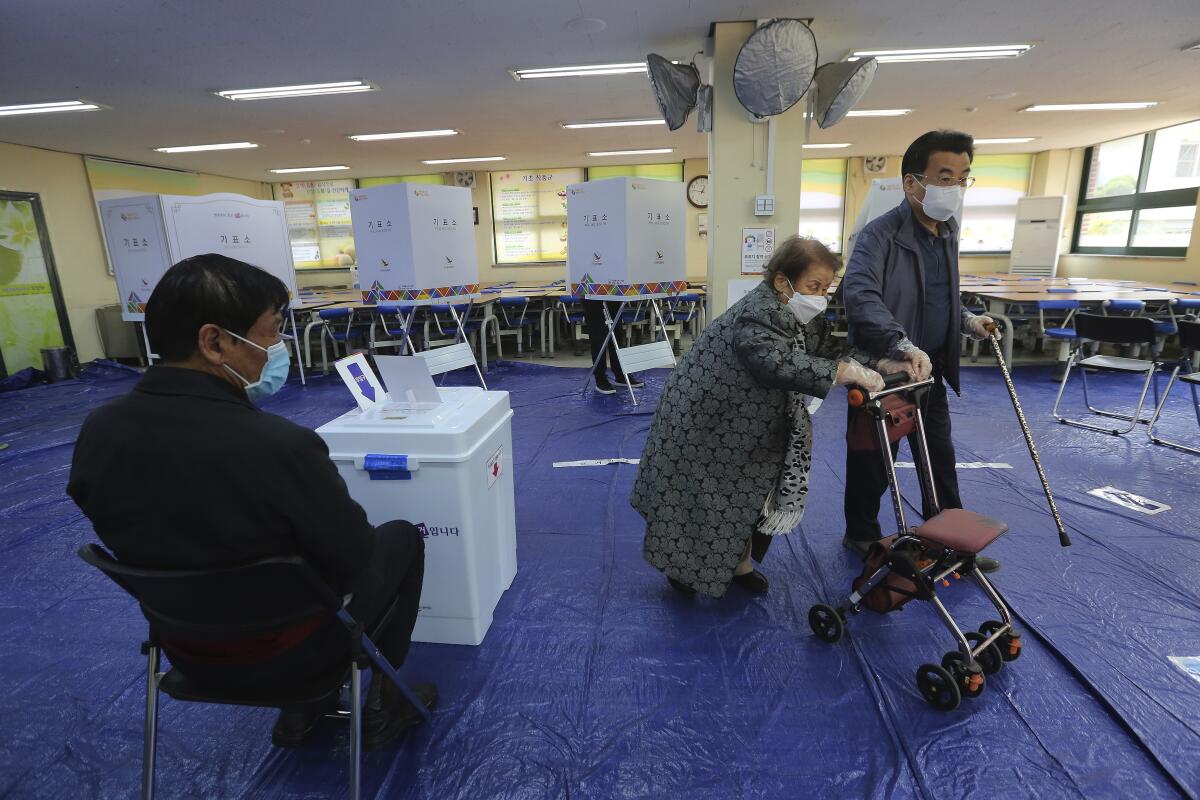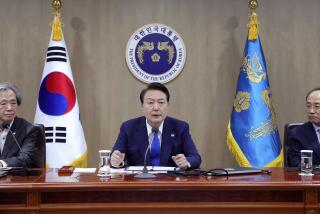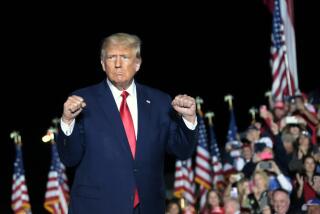Democracy beats the coronavirus in South Korea as voters turn out in record numbers

SEOUL — Even as the COVID-19 pandemic puts civic life on hold in many countries around the world, South Koreans turned out in record numbers to vote in their country’s parliamentary elections Wednesday, setting aside fears of the coronavirus in a democratic show of force.
More than 17 million voters went to the polls Wednesday, joining 12 million who had previously cast their ballots in early voting. The record total flouted expectations that the virus outbreak would dampen voter participation and marked a 66.2% turnout, the highest since 1992.
Voting at more than 14,000 polling stations across the country — at which voters were required to have their temperature taken, wear disposable plastic gloves and line up at three-foot intervals — appeared to run smoothly. More than 13,000 people under mandatory quarantine were also allowed to vote in the hour after polls closed to other voters, in separate booths where poll workers wore goggles and white head-to-toe protective suits.

South Korea provides lessons the U.S. and other countries could have learned to prevent the spread of coronavirus.
Whether the precautions were enough to significantly offset the risks of transmission presented by millions of people going to the polls remains to be seen. Despite not having imposed a large-scale lockdown or business closures as other countries have, South Korea has managed to slow the rate of new infections to a couple dozen a day this week.
South Korea is one of a handful of countries to press ahead with elections as dozens of others have postponed theirs owing to the coronavirus outbreak.

If it becomes clear in coming weeks that South Korea has managed to pull off a nationwide election without jeopardizing public health, the country could serve as an example for others trying to protect democracy and minimize the virus’ toll.
As the votes were still being tallied, U.S. Secretary of State Michael R. Pompeo congratulated South Korea on holding “successful” elections in the midst of a pandemic. “South Korea’s dedication to democratic values and a free and open society is what the world needs to fight #COVID19,” he wrote on Twitter.
Voters on Wednesday included two women 116 years of age as well as 18-year-olds newly allowed to vote thanks to a lowered voting age. The election was widely viewed as a midterm referendum on President Moon Jae-in.
The results were a resounding victory for Moon and his Democratic Party. It and an allied party were on track to take three-fifths of 300 National Assembly seats, giving the incumbents an unprecedented majority. The president has received a boost in approval ratings from South Korea’s early and extensive response to the coronavirus outbreak.
Thae Yong-ho, a former North Korean diplomat who defected to the South, running as a member of the opposition conservative party, secured a seat representing a wealthy district in Seoul, becoming the first North Korean refugee to be directly elected a legislator. Former Prime Minister Lee Nak-yeon, who until January served in Moon’s government, and Moon’s former spokeswoman, Ko Min-jung, both won their closely watched legislative races.
Lee Che-hwa, 33, said that before coming out to vote Wednesday, he’d largely stayed indoors out of coronavirus concerns since losing his job at a hostel a month ago, when travel dried up because of the pandemic.
With a 5 o’clock shadow showing under a white mask — which all voters were required to wear to enter polling stations — Lee said voting mattered now more than ever to make sure the country and its economy were in good hands.
“This is not just Korea,” he said. “It’s going to be a worldwide problem of how we’re going to survive.”
Casting his vote for the ruling party, Lee said he was satisfied with the government’s handling of the outbreak and the measures it has announced to help people like him who have been affected by the pandemic. He said he felt assured the voting setup was safe.
Ko Hyung-pyo, a 46-year-old management consultant, said all his acquaintances were eager to vote because the country was polarized between liberals supportive of Moon and conservatives who vehemently oppose his North Korea and economic policies.
“Of course the interest is high. The coronavirus has dominated everything, and whether you’re liberal or conservative, you think, if I don’t go out to vote, my side is going to be at a disadvantage,” he said.
Ko said he split his ballot Wednesday, voting for a conservative candidate and a more progressive party, hoping for some balance in the country’s politics. Because South Korea’s National Assembly is a combination of directly elected district representatives and proportional seats assigned to parties based on voter support, each constituent votes for a district candidate and a party.
“I’d like for them to come together in one voice and give society some hope,” he said. “We’re all worried about what’s going to happen after the coronavirus.”
More to Read
Sign up for Essential California
The most important California stories and recommendations in your inbox every morning.
You may occasionally receive promotional content from the Los Angeles Times.











